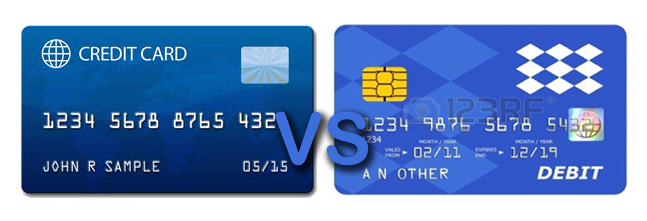Debit cards and credit cards have made life much easier for you as you can now shop without carrying large amounts of cash and exact change, or worrying about losing your money. A debit card is an important tool just like a credit card, but they perform different functions.
 A debit card allows you to use the money present in your bank account and a credit card gives you an amount to spend after determining your credit history and income. Though both the cards give easy access to money, there are certain differences between a credit card and a debit card. Read on to know what makes the two cards different.
A debit card allows you to use the money present in your bank account and a credit card gives you an amount to spend after determining your credit history and income. Though both the cards give easy access to money, there are certain differences between a credit card and a debit card. Read on to know what makes the two cards different.
- Nature of transactions
When you withdraw from or swipe a debit card, the amount is deducted from your savings or current account, which means that you use your own money. However, when you use a credit card, the issuer lends you an amount known as a credit limit. Typically, you can return the amount borrowed within the timeframe allotted (a month) and you will not be charged any interest. If you cannot pay the entire amount in full, make it a point to pay the minimum due, which is usually 3% of the amount utilised. The balance amount is rolled over to the next billing cycle and you have to pay a steep interest rate on it until you clear it.
- Quantum of rewards
One of the many debit and credit card benefits are the reward points that they offer. Debit cards give reward points on booking movie tickets and travel tickets, dining at certain restaurants and more. Credit cards give you similar benefits and additional rewards that can make using it a lucrative experience.
Usually, credit card issuers tie up with brands to offer additional points or rewards when you make a purchase through them. This could be a fashion label, an airline, a petrol pump or a supermarket. Besides, you can earn welcome reward points and more on every transaction that you make. For example, the Bajaj Finserv RBL Bank SuperCard gives you up to 20,000 points as a welcome gift, along with several rewards and bonus points.
When choosing a credit card, you can also pick one that offers better rewards on certain kinds of expenses. For example, fuel credit cards give reward points every time you swipe the card to pay for fuel, and others may give you accelerated reward points when you book air tickets or eat out.
- Impact on credit score
While a credit card lets you build a credit score, a debit card doesn’t as it is your own money that you’re using and there is no borrowing involved. This is one of the best credit card benefits. Having a good credit score can help you loans of substantial amounts, with flexible terms in the future. So, invest time and effort towards building your credit score by using your credit card smartly. This is important because even if you don’t need a loan now, a good credit score will certainly help you avail one in the future.
- Monitoring transactions
Since a debit card deducts money from your savings or current account, you don’t need to monitor it much. The only thing you have to ensure is that it doesn’t run out of balance. However, a credit card gives you a fixed limit. While using a credit card wisely is important, make it a point not to cross your limit each month as it will impact your credit score and make repayment difficult as well.
- Access to additional credit
Sometimes, you may need emergency cash and applying for a loan may not be very feasible. To address such issues, some debit cards give you an overdraft facility that lets you draw in excess of your balance. However, such a facility is minimal and may not be enough to cater to your needs. To make it convenient for you, credit card issuers usually allow you to convert your credit limit into a loan to obtain a larger amount. For instance, the Bajaj Finserv RBL Bank SuperCard lets you convert your credit limit into an interest-free personal loan for up to 90 days. So you can avail the service while only paying a flat processing fee of 2.5%.
Now that you know the difference between credit card and debit card, you are in a better position to evaluate your needs and choose one that is best for you. If you need to work on managing your finances, it is better that you stick to a debit card. However, if you are more disciplined, it is best to apply for both cards to build equity and fuel your expansion.






